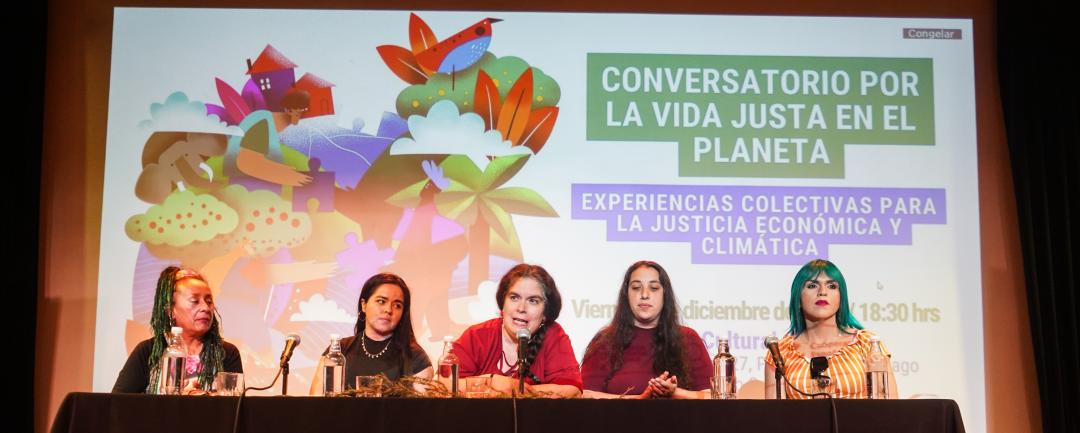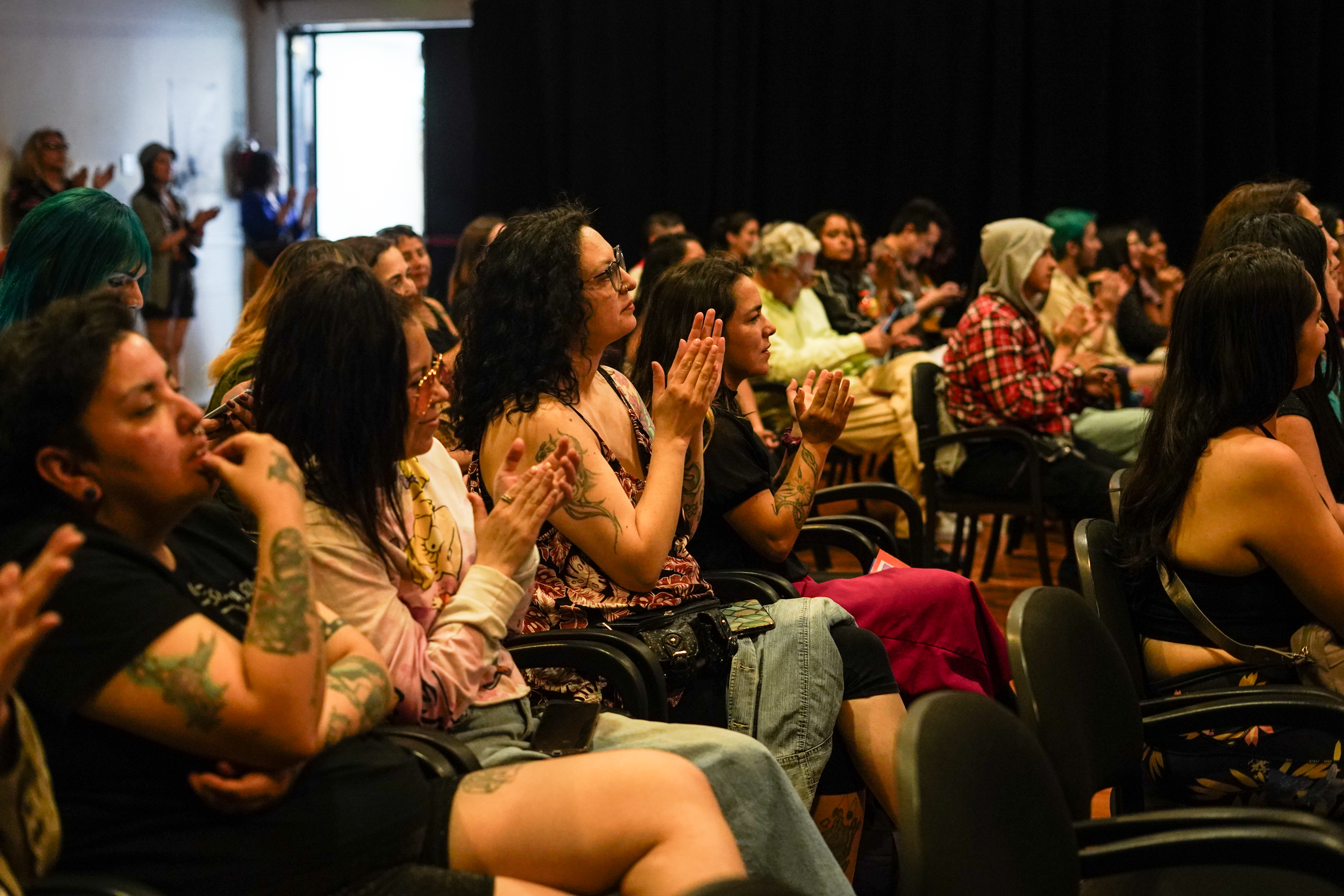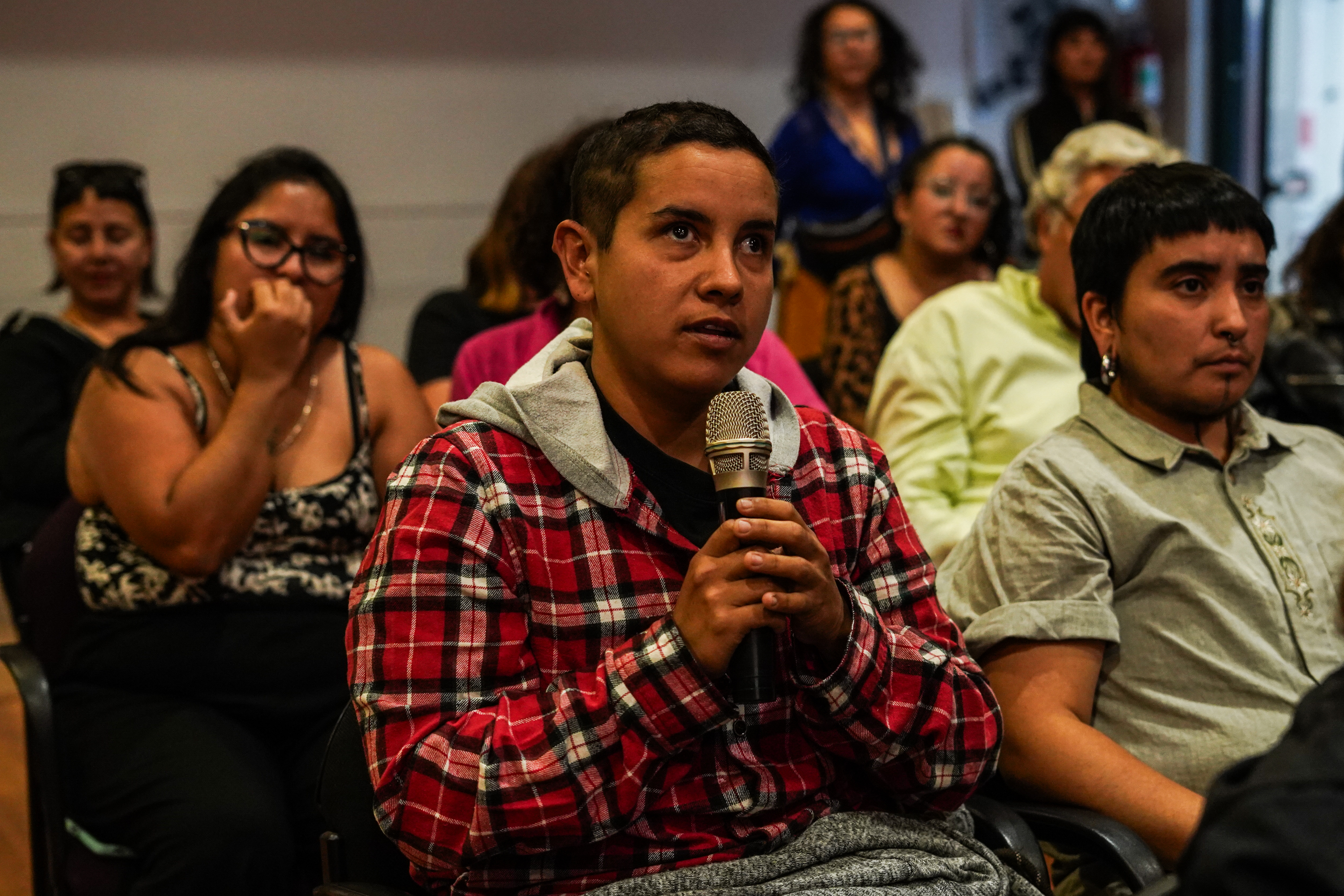
About 90 people gathered on December 1 at the Cultural Center of Spain for the Conversation for Just Life on the Planet. The strategies from the territories for Economic and Climate justice were the topics addressed in the voices of activists from Chiloé, Wallmapu, Santiago, Penco-Lirquén and Arica.
What does a just life mean? How do we move towards it from our activisms and territories? These were some of the questions that were answered in the “Conversation for a fair life on the planet.” Collective experiences for Economic and Climate justice. “It seems to us that the global context of crisis is an unavoidable issue. There is a genocide in Palestine. A humanitarian and rights crisis towards migrants. There is sexist and racist violence. There is precariousness of the communities. There is climate change driven by extractivism and an advance of conservative movements, which makes it urgent to look not only at what is happening, but at how we face the context collectively,” said Victoria Viñals, Communications Manager at Fondo Alquimia and presenter of activity.
Alicia Muñoz, member of the Board of Directors of Fondo Alquimia and president of ANAMURI, offered some opening words where she highlighted the importance of paying attention to the context: “We cannot continue ignoring the inequalities generated by accumulation due to dispossession of rights. Today in Chile half of the workers earn less than 400 thousand pesos. For this reason and for so many things that happen, it is important to declare our commitment to what we do: putting an end to economic and climate injustices and also to violence against women and diversities. We have to continue for our rights with conviction and hope. We will turn our resolutions into actions and into struggle.”
After the presentations, a panel was formed made up of representatives of organizations supported by Alquimia and that work on these issues: Scarleth Fernández from the Dises Center of Arica, Francisca Carril from the Assembly of Insular Women for Water (AMIPA) of the Chiloé Archipelago, Camila Inostroza from Sur Territoria de Wallmapu and Leticia Silva from Ecolety, from San Bernardo. In addition, the panel was moderated by the ecofeminist and activist of the Movement for Waters and Territories, Francisca Fernández Droguett.
“I think that many of us do not live that fair life, but we do daily try from the smallest details to ensure that it is fair. So righteous life is a dispute. And here we have four wonderful companions who dispute that fair life on different sides. We know that there is a constant and systematic ecocide, there is environmental racism, there is a climate debt of transnational states, which are the causes of the crises. Many times they want to make us feel that all of us who are here are actors in the crisis and it is quite the opposite. Most of the time we are the ones who are stopping this crisis through practices such as food, energy and community self-determination of water and with our own loving practices,” said Fernández.


Territorial activism: building economic and climate solutions
Scarleth Fernández, trans activist from the Dises Center of Arica, referred to how they face crises and work for a just life based on sexual and gender dissidence: “For those of us who are corporeally outside the norm that is imposed, we are It makes the possibility of being able to have a just life, of even being able to have a just death, seem alien and distant. From there we have been establishing relationships that allow us to create community solidarity to be able to resist and survive in this system. Regarding how we are experiencing and resisting in the territories, we work for health for our community and above all for the trans labor quota that can open other opportunities for a fair life for dissidents.”
Then Francisca Carril from AMIPA spoke, sharing the problems that afflict the Chiloé Archipelago, which are directly related to extractivism, the installation of the energy industry, such as wind plants and transmission lines, among others. Projects that often pass through sacred territories for the indigenous communities of those sectors. “In order to live and have a fair life, a dignified life, we have approached it from different ways and mainly now we find ourselves, on the one hand, mapping all these socio-environmental conflicts, from the own experiences of the companions of the entire archipelago and where “We are also making it visible and trying to make noise.” Emphasizing the importance of accessing information and being able to disseminate it, adding that they are currently articulating with other organizations, exchanging knowledge, as an exercise that is also therapeutic for those who mobilize.
For her part, Camila Inostroza from Sur Territoria shared her experiences as an activist and resident of the Wallmapu territory: “Militarization is very worrying, since we realize that, since the territories are militarized, it is much easier for these transnational companies extractivist destroy the territory.” Along the same lines, he added that “we also see how there is judicial political persecution of defenders of nature. Currently in Wallmapu there is a worrying situation, since there are many lamien who are imprisoned, with very extensive trials and political setups.” To contrast these situations, in the Sur Territoria organization they focus on education and popular community training of the communities.
Finally, from San Bernardo in the Metropolitan Region, Leticia Silva from the Ecolety organization, declared: “Starting is so difficult for us, there are so many difficulties that we have to be able to have economic autonomy, that as a project, as women, 13 years ago we considered how to get out of economic violence, how to go it alone. So, in order to provide a solution from our own realities, from our jobs, we started with small workshops and to this day we have held workshops, we have grown as a school and we have given solutions to many colleagues who lived from these complex situations, giving them jobs. ”.
The experiences of these four activists, who come from different territories, are undoubtedly significant and respond to the movement that women and gender-based dissidents are raising throughout the country, who are confronting the economic and environmental system, through daily resistance and activism. , proving that another future is possible.






